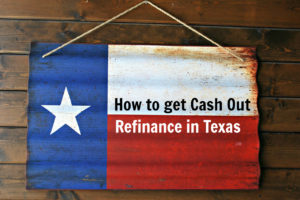If you’re a homeowner with an FHA mortgage and have built up considerable home equity, you may be able to tap into that equity with an FHA cash-out refinance loan. This type of refinance allows you to replace your existing mortgage with a new, larger mortgage and receive the difference in cash. Today we’ll cover the FHA cash out guidelines that you need to keep in mind.
With home values rising significantly in recent years, it may be a good time to consider cashing out some of your equity.
What is an FHA Cash Out Refinance?
An FHA cash-out refi enables you to access a portion of your home’s equity while still maintaining a mortgage insured by the Federal Housing Administration.
When you do a cash out refinance, the mortgage on your current home is paid off in full and you have a new 1st mortgage.
It’s important to understand the FHA’s guidelines and requirements for cash-out refinances to make sure it’s the right move for your financial situation.
Here’s an overview of what you need to know about FHA cash-out refinance guidelines.
Maximum Loan-to-Value Ratio
One key guideline for FHA cash-out refinance is the maximum loan-to-value (LTV) ratio allowed. For a cash out refinance the max is 80% of the home’s appraised value. So if your home appraises for $400,000, the maximum new mortgage would be $320,000 (80% of $400,000).
Minimum Credit Score – FHA Cash Out Guidelines
As with other FHA loans, there are minimum credit score requirements for cash-out refinances.
Most lenders will require a credit score of at least 620.
However, FHA allows these loans to be done with as low as 500 score.
Please keep in mind, having a 500 score does not mean you’re automatically going to be approved.
Everyone’s credit profile is unique, so it just depends what is showing on your report.
It’s extremely important that you work with a loan officer that is highly experienced with getting low credit cash out refinance loans approved.
Income Requirements – FHA Cash Out Guidelines
Lenders will also closely examine your income, employment history, and existing debts to ensure you can comfortably afford the payments on the new mortgage.
Typically you’ll need to meet a maximum debt-to-income ratio of 50% or lower.
In basic terms, this means your monthly liabilities including the new mortgage with taxes and insurance, needs to be half of what your income is.
So if your income is $8,000/month, then your monthly debt needs to be $4,000 or less per month.
However, there are many cases when borrowers are able to get approved up to 57% debt-to-income ratio. This depends on credit score, loan term, and loan-to-value ratio.
Uses For Cash-Out on FHA Loans
As for how you can use the cash-out funds, the funds can be used for a variety of purposes:
- Making home improvements, repairs or renovations
- Paying off existing debt
- Covering college tuition or education expenses
- Using as a cash reserves or safety net
Documentation Requirements – FHA Cash Out Guidelines
Expect to provide supporting documents for your refinance, including but not limited to:
- Two most recent W-2s or tax returns (if self-employed)
- Most recent 30 days of pay stubs
- Divorce decree or child support documents if applicable
- Government issued ID
- Explanation letter for any derogatory credit events in the past 12 months
- Homeowners insurance declarations page
- Most recent mortgage statement
Other Requirements – Additional FHA cash-out refinance guidelines to be aware of:
- Must have owned and occupied the home for at least 12 months (unless the home was inherited)
- Appraisal with interior inspection is required (no waivers)
- Closing costs can be rolled into the loan other than the cost of the appraisal in most cases
Loan limits vary by county, you can check the loan limits in your county here.
In Summary
The 4 most basic guidelines to keep in mind for an FHA Cash out refinance:
- Maximum 80% loan-to-value ratio
- Minimum 500 credit score
- Maximum 57% debt-to-income ratio
- Must have owned and occupied the home for at least 12 months (unless it was inherited)
Weigh the Costs vs. Benefits. An FHA cash-out refi can provide homeowners with valuable access to their home equity when cash is needed. Just be sure to carefully consider the fees, interest rate, closing costs, and long-term costs versus the benefits of receiving a cash lump sum.
An experienced FHA lender can help you crunch the numbers and determine if cashing out makes good financial sense for your situation.

I invite you to reach out.
Get your questions answered.
We have been extremely successful with getting borrower approved even when other lenders said it wasn’t possible.
If for some reason we cannot help, we’ll do our very best to give you an action plan on what needs to happen to make yourself eligible.










What questions do you have?